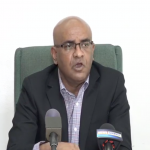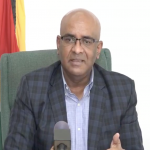
The Government of Guyana has broken its silence on the highly controversial report on Guyana’s oil agreement with ExxonMobil and the government has pointed out that the report failed to identify any incidence of corruption and or malpractice.
In a statement this evening, the coalition government said it believes the report was seemingly released to influence the historic March 2 General and Regional Elections.
The report, which was released by international non-governmental agency (NGO), Global Witness, on Monday, fingered Minister of Natural Resources Raphael Trotman in what it described as an “exceptionally bad” oil deal for Guyana.
But according to the government, this was a “malicious attempt” to discredit officials of the Government and there is no establishment of corruption and or malpractice.
To further support its claim, the government referenced a section of the report which states explicitly that: “Global Witness is not suggesting that Trotman’s Texas trip violates US or Guyanese anti-corruption laws.”
The NGO’s report also admits that it: “does not allege that Trotman deliberately negotiated a bad deal, or deliberately ignored information that would in fact have gotten Guyana a better deal.”
The government also said the “sensationalist, agenda-driven and extraordinarily speculative” report seeks to influence impending general and regional elections.
“The Government of Guyana views the report as a cunning and calculated attack on a sovereign state with a duly elected Government mere weeks before an election. This timing cannot be seen as a coincidence and it appears as though it is seeking to influence the electoral outcome,” the statement read.
Several political parties have since picked up on the report, using it as a basis to discredit the government for its handling of the country’s emerging oil sector.
But the executive is maintaining that the agreement is a “fair” one which is designed to benefit the people of Guyana.
The contract between Guyana and ExxonMobil allows for Guyana to benefit from 50 per cent of profit oil, two per cent royalties, an already deposited US$18M signing bonus, and direct employment of close to 2000 Guyanese among other things.
Oil and gas analytical firm Rystad Energy also supports the government’s claim that Guyana stands to benefit from the current deal.
Rystad Energy noted that: “in the current fiscal regime, the government collects its share through a 2% royalty and a 50% profit oil levy. Rystad Energy estimates that this will give the government 60% of the profit from the various projects (government take).
The average government take of 60% in Guyana is indeed favorable when compared to other large offshore producers. [F]or countries that only recently opened up for [Exploration and Production] activities – such as the Falkland Islands, Israel, Mozambique and Mauritania – the government take is in the range of 50% to 65%.”
Earlier on Tuesday, Forbes Magazine, a leading financial publication, shredded Global Witness’ report, saying that it was an “ideologically-motivated attack piece”.
International Lawyer, Melinda Janki also recently described the report as being highly “speculative, misleading and unreliable”.
Janki, who has been offering technical insight into the oil agreement, identified several glaring flaws in the calculations contained in the report; the most obvious being that Guyana does not get “revenue” from the agreement, but rather oil, since it was a production sharing agreement that was signed and not a profit-sharing agreement.
ExxonMobil has since discovered 16 oil wells which it estimates contains more than eight billion barrels of oil.

















You must be logged in to post a comment Login